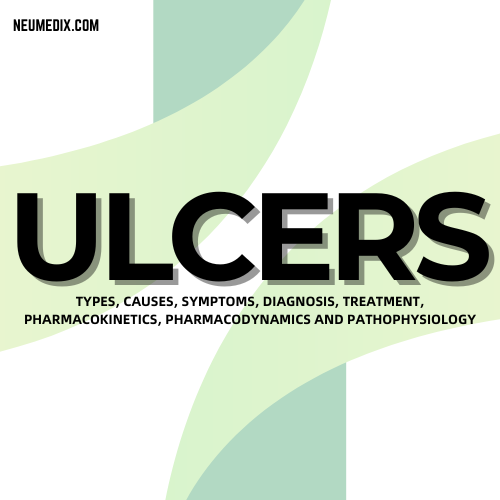Ulcers are open sores that develop on the lining of the digestive tract or other mucous membranes in the body. They can occur in various parts of the body, including the stomach (gastric ulcers), small intestine (duodenal ulcers), and esophagus (esophageal ulcers). Ulcers can be painful and may lead to complications if left untreated.
2. Types of Ulcers:
- Gastric Ulcers: These ulcers occur in the lining of the stomach.
- Duodenal Ulcers: These ulcers develop in the upper part of the small intestine, known as the duodenum.
- Esophageal Ulcers: These ulcers form in the lining of the esophagus, typically as a result of gastroesophageal reflux disease (GERD) or other underlying conditions.
3. Symptoms of Ulcers:
- Abdominal Pain: A dull, burning, or gnawing pain in the abdomen, particularly between meals and at night, is a common symptom of ulcers.
- Indigestion: Indigestion, bloating, or discomfort after eating may occur.
- Nausea and Vomiting: Some individuals with ulcers may experience nausea and vomiting.
- Loss of Appetite: A decreased appetite or unintended weight loss may occur.
- Bleeding: In severe cases, ulcers may cause bleeding, leading to bloody or black stools (melena) or vomiting blood (hematemesis).
- Fatigue: Chronic blood loss from ulcers can lead to fatigue and weakness.
4. Causes and Risk Factors:
- Helicobacter pylori (H. pylori) Infection: The bacterium H. pylori is a common cause of gastric and duodenal ulcers.
- Nonsteroidal Anti-Inflammatory Drugs (NSAIDs): Regular use of NSAIDs, such as aspirin, ibuprofen, or naproxen, can increase the risk of developing ulcers.
- Excessive Alcohol Consumption: Heavy alcohol consumption can irritate the lining of the stomach and increase the risk of ulcers.
- Smoking: Smoking cigarettes can weaken the protective lining of the stomach and increase the risk of ulcers.
- Stress: While stress does not directly cause ulcers, it can exacerbate symptoms and delay healing in individuals with existing ulcers.
5. Diagnosis of Ulcers:
- Endoscopy: Upper endoscopy, also known as esophagogastroduodenoscopy (EGD), is the most common method used to diagnose ulcers. During this procedure, a thin, flexible tube with a camera (endoscope) is inserted through the mouth and into the digestive tract to visualize the lining of the esophagus, stomach, and duodenum.
- Biopsy: During endoscopy, tissue samples (biopsies) may be collected for further examination to detect the presence of H. pylori infection or rule out other conditions.
- Barium X-ray: A barium X-ray, also known as an upper gastrointestinal (GI) series, may be performed to visualize the upper digestive tract and identify abnormalities, such as ulcers.
6. Pharmacokinetics (PK) and Pharmacodynamics (PD) of Ulcer Treatment:
- Proton Pump Inhibitors (PPIs): PPIs, such as omeprazole, esomeprazole, and lansoprazole, are commonly used to reduce stomach acid production and promote ulcer healing.
- Antibiotics: If H. pylori infection is present, a combination of antibiotics (such as amoxicillin, clarithromycin, and metronidazole) may be prescribed to eradicate the bacteria.
- H2-Receptor Antagonists: H2-receptor antagonists, such as ranitidine or famotidine, may be used to reduce stomach acid production and alleviate symptoms.
7. Pathophysiology of Ulcers:
- Ulcers develop when there is an imbalance between the factors that protect the lining of the digestive tract and those that promote damage.
- Factors that contribute to ulcer formation include the presence of H. pylori bacteria, excessive stomach acid production, prolonged use of NSAIDs, and other underlying conditions.
- Ulcers may erode through the mucous membrane and expose the underlying tissues, leading to inflammation, pain, and potential complications.
8. Conclusion: Ulcers are open sores that develop on the lining of the digestive tract or other mucous membranes in the body. They can cause abdominal pain, indigestion, nausea, bleeding, and other symptoms. Prompt diagnosis and treatment are essential to prevent complications and promote healing. Treatment typically involves medications to reduce stomach acid production, antibiotics to eradicate H. pylori infection (if present), and lifestyle modifications to minimize risk factors. If you experience symptoms suggestive of ulcers, consult a healthcare professional for proper evaluation and management.




